Abstract
The acceptability of presymptomatic testing in 21 people at 50% risk for the APP-692 mutation causing presenile Alzheimer's disease or cerebral haemorrhage resulting from cerebral amyloid angiopathy (FAD-CH), and in 43 people at 50% risk for hereditary Pick disease (HPD) was assessed. Neither group differed in demographic variables. Thirty-nine people (64%) in the whole group would request presymptomatic testing if it were clinically available, although two-thirds did not yet feel ready to take it. The most important reasons in the HPD and FAD-CH group for taking the test were: to further basic research (42% and 47%, respectively), informing children (47% and 50%, respectively), future planning (29% and 47%, respectively), and relieving uncertainty (46% and 27%, respectively). The most commonly cited effect of an unfavourable test result concerned increasing problems for spouses (75% and 76%, respectively) and children (61% and 57%, respectively). Most respondents denied that an unfavourable result would have adverse effects on personal mood or relationship. One-third of all respondents favoured prenatal testing where one of the parents had an increased risk for HPD or FAD-CH. Participants would encourage their offspring to have the test before starting a relationship (35%) and before family planning (44%). Thirty-seven percent of the respondents would encourage their children to opt for prenatal diagnosis. People at risk for HPD were significantly more preoccupied with the occurrence of potential symptoms in themselves, compared with those at risk for FAD-CH, reflecting the devastating impact that disinhibition in the affected patient has on the family. Our findings underline the need for adequate counselling and the availability of professional and community resources to deal with the impact of test results in subjects and their relatives.
Full text
PDF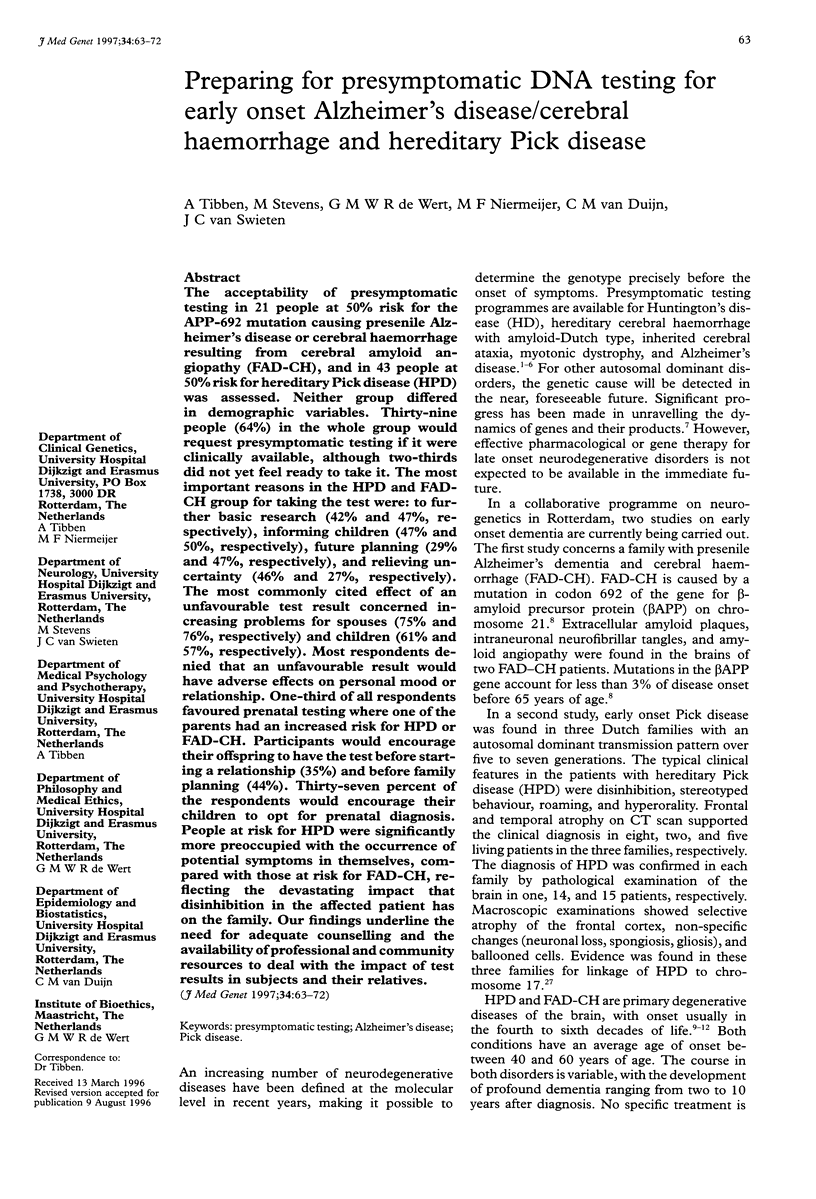
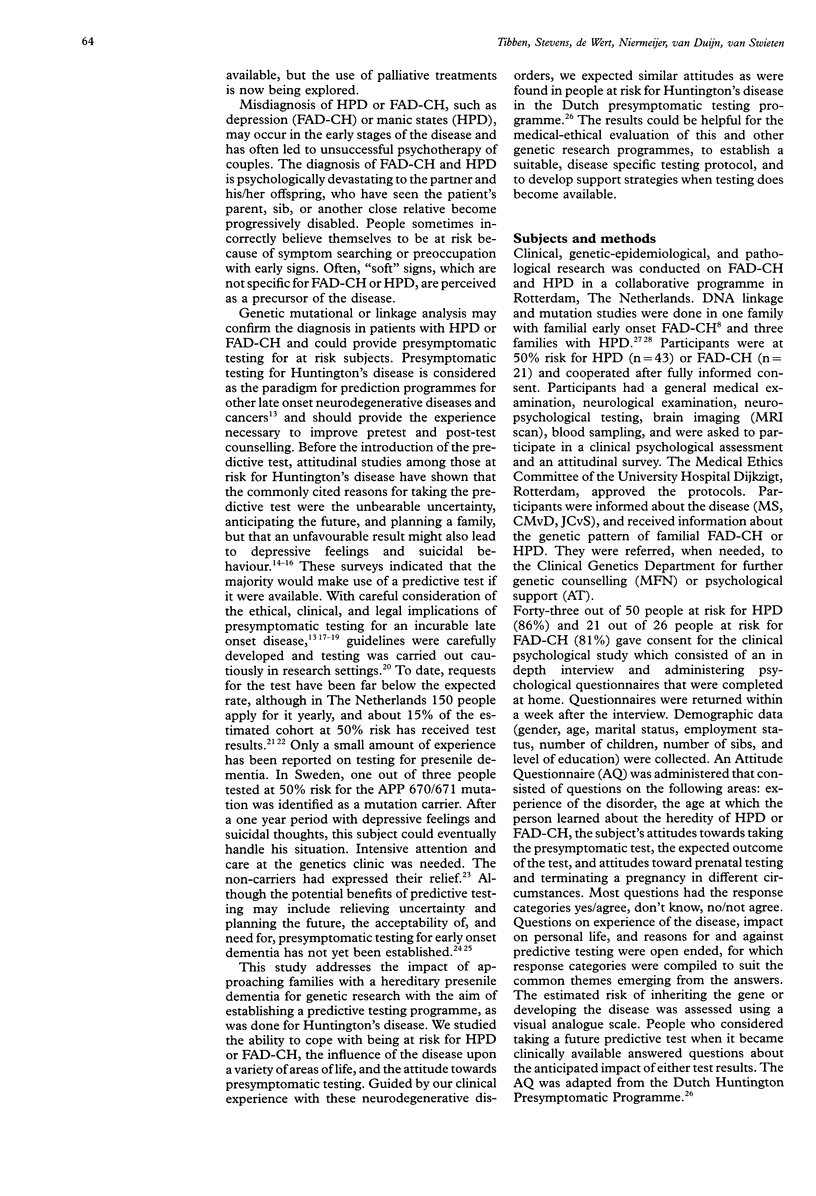
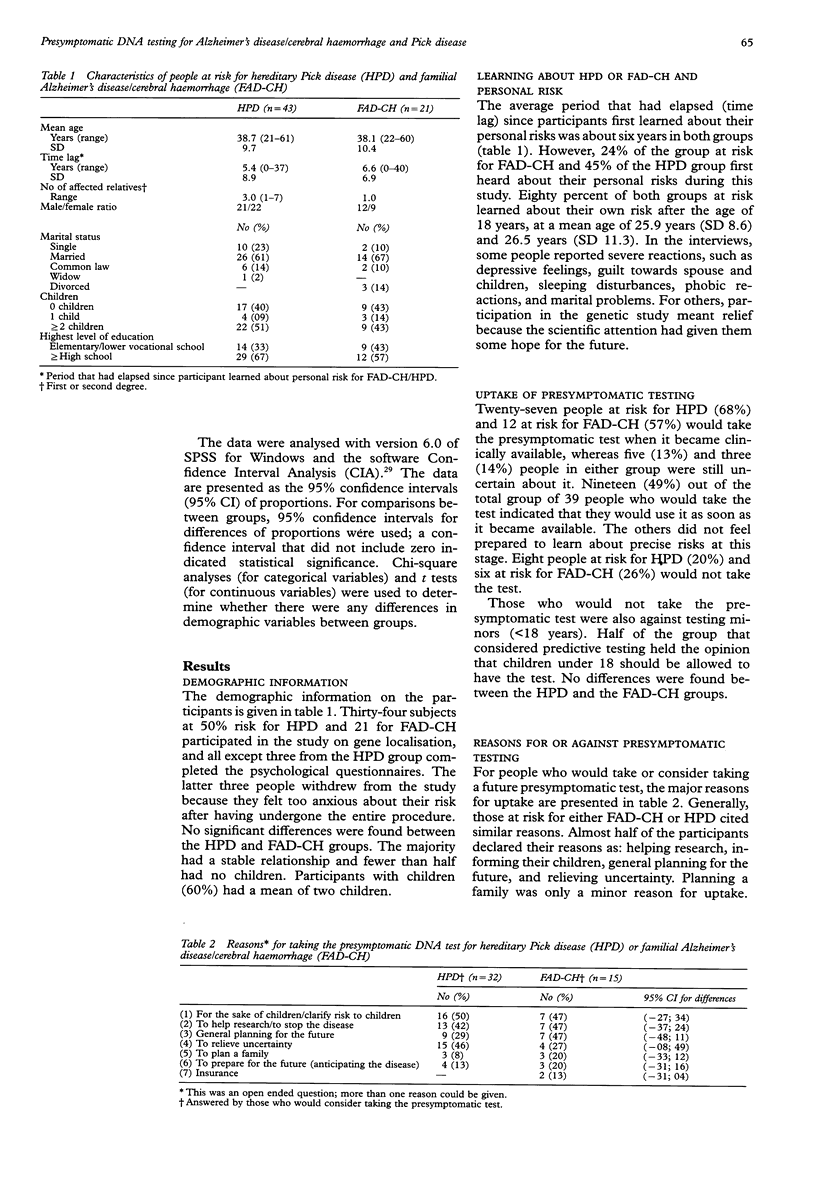
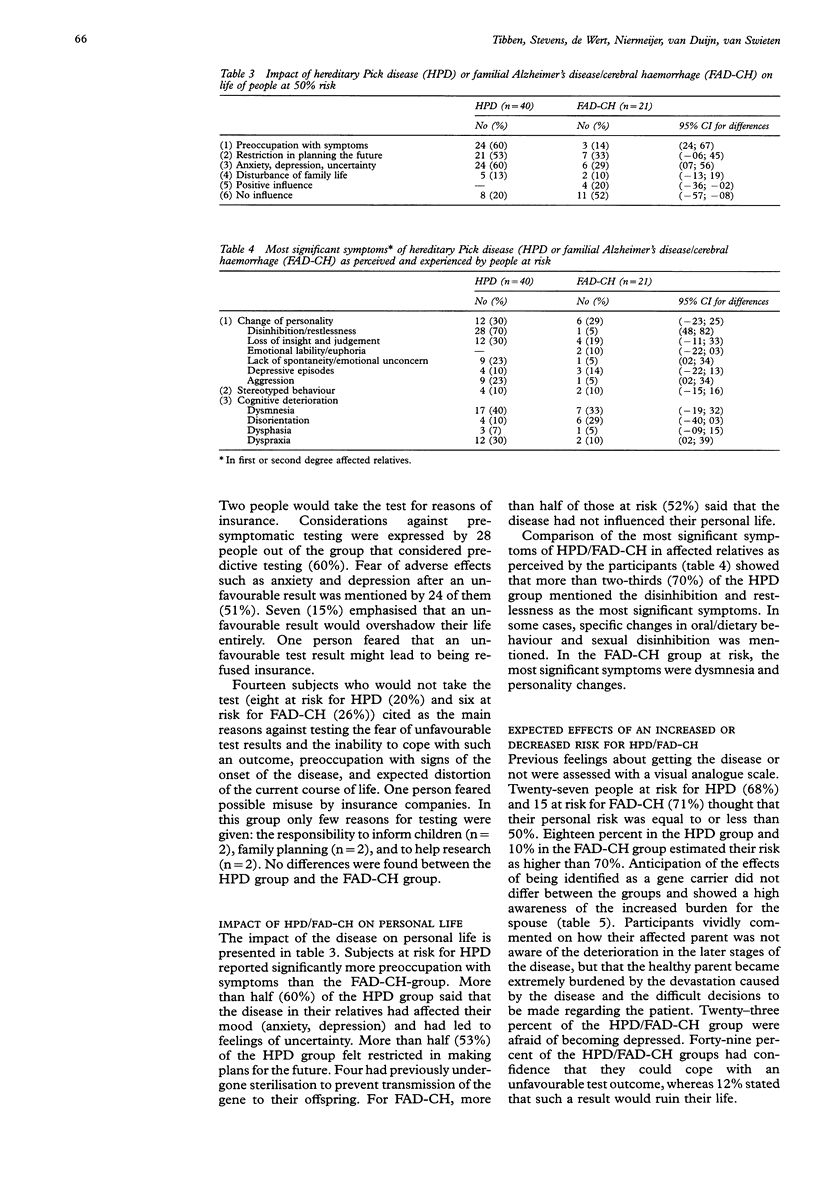
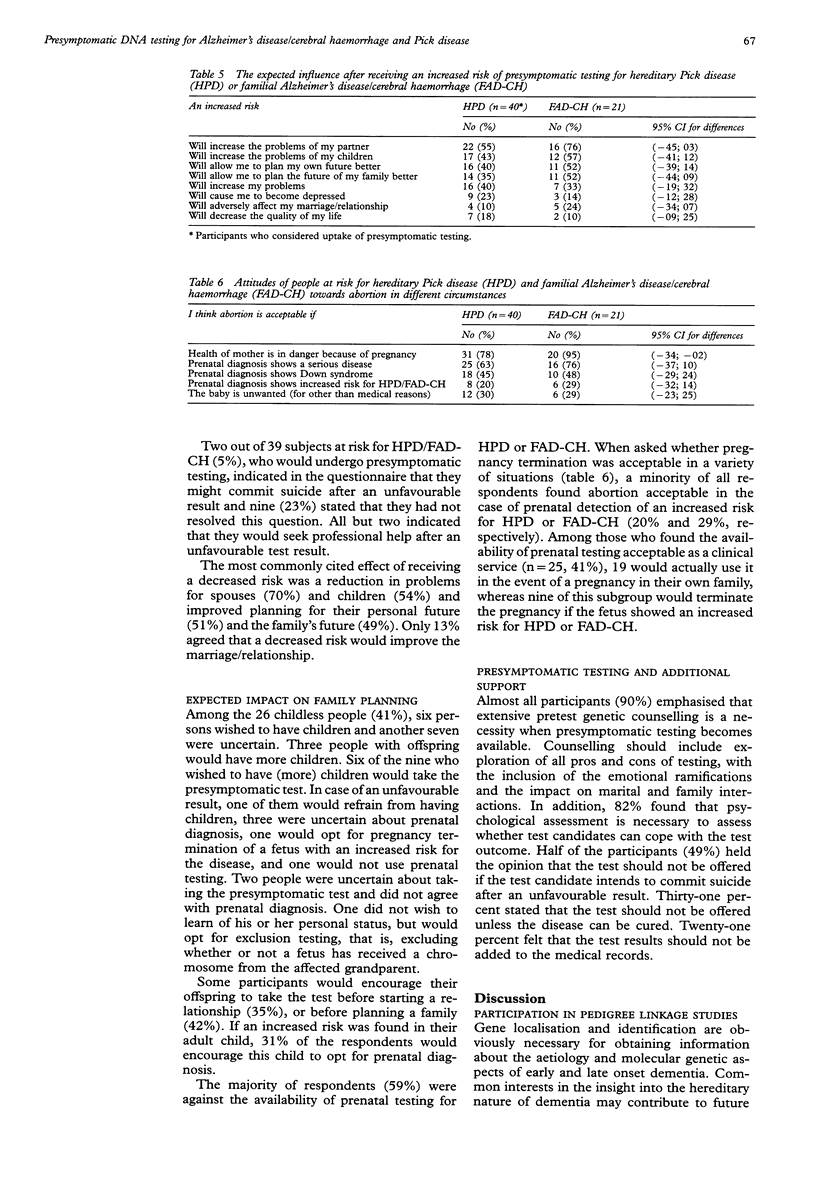
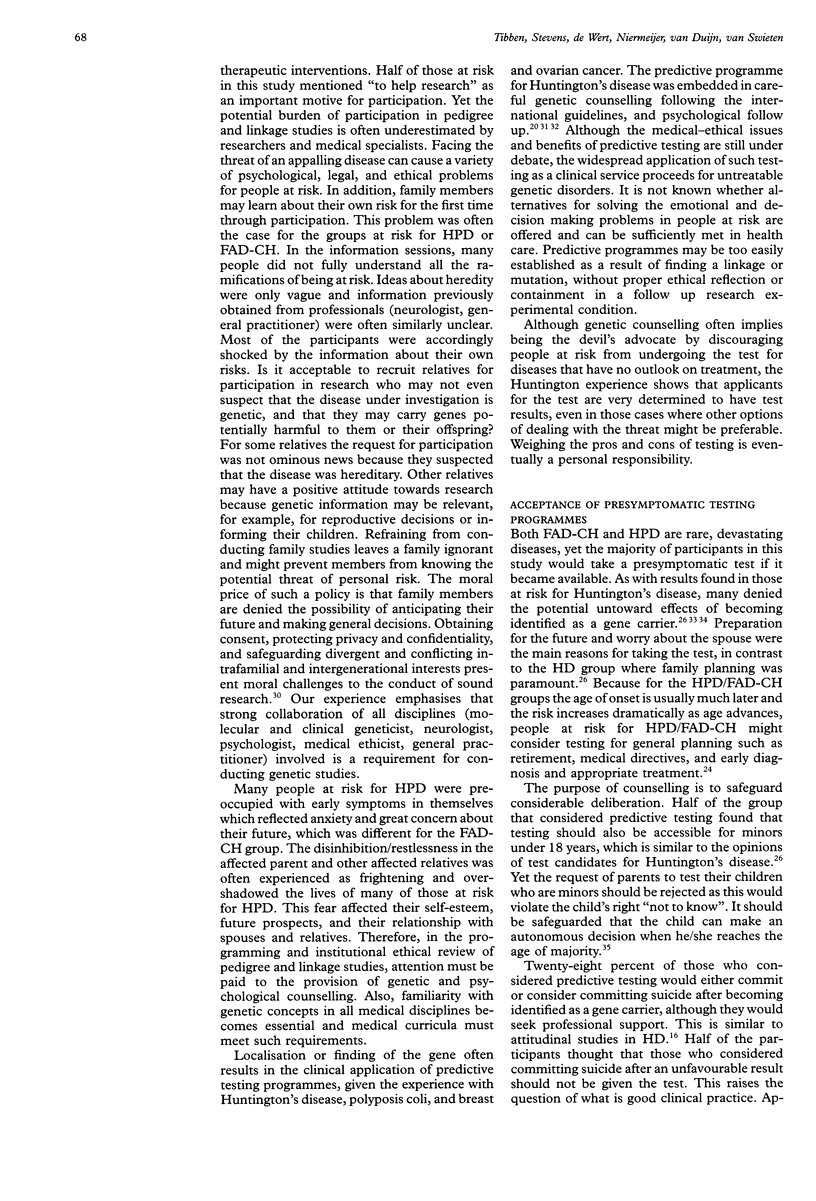
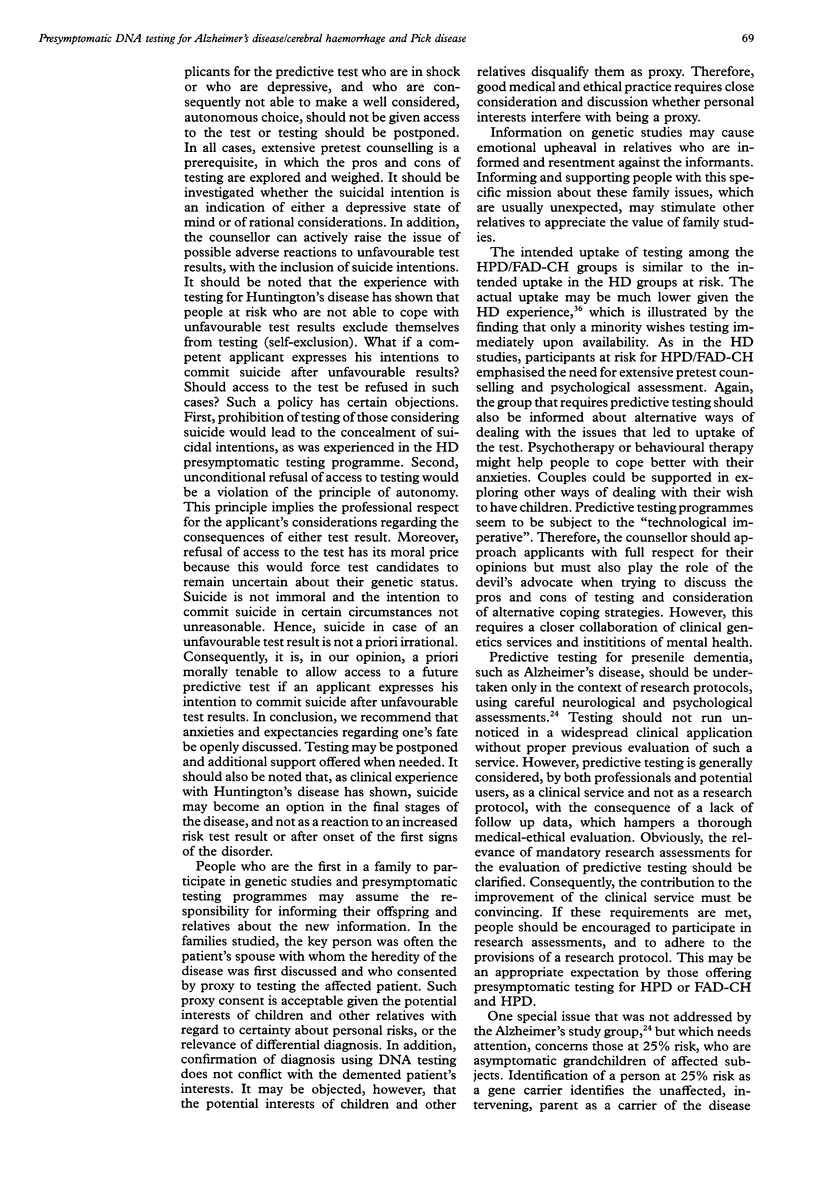
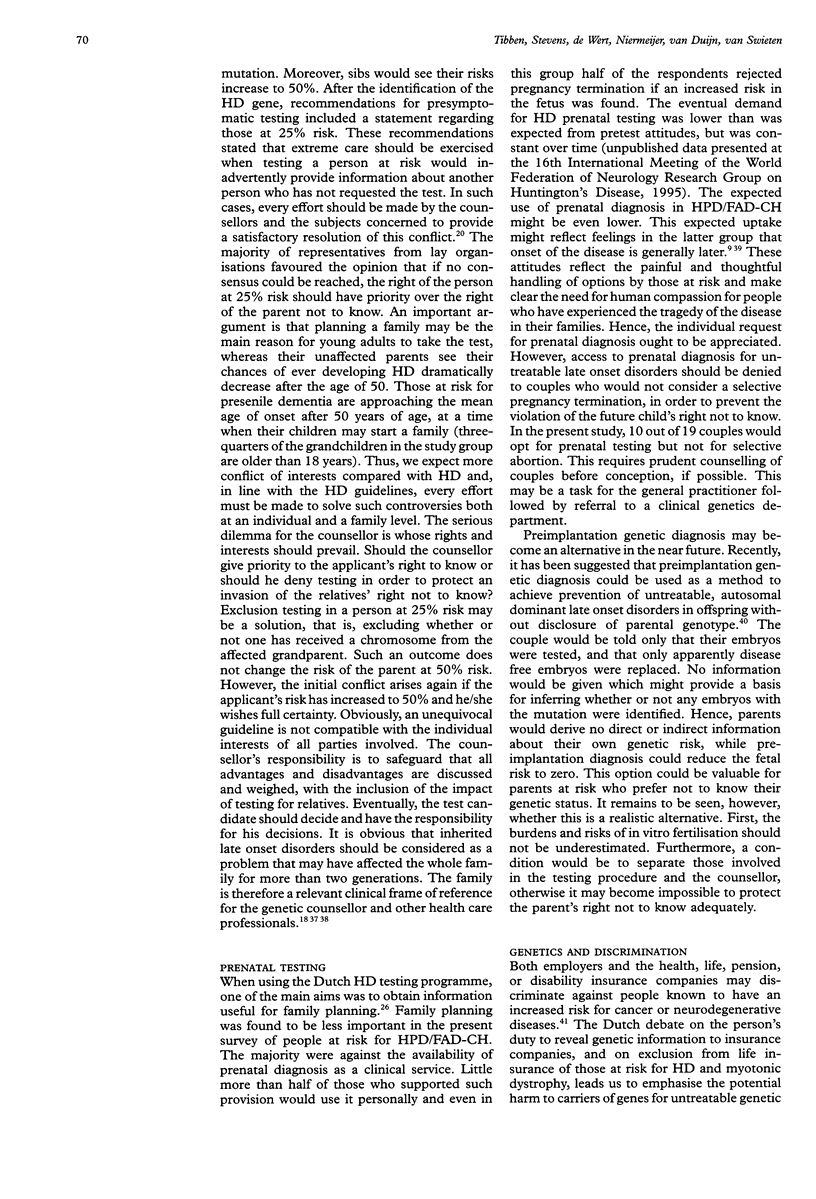
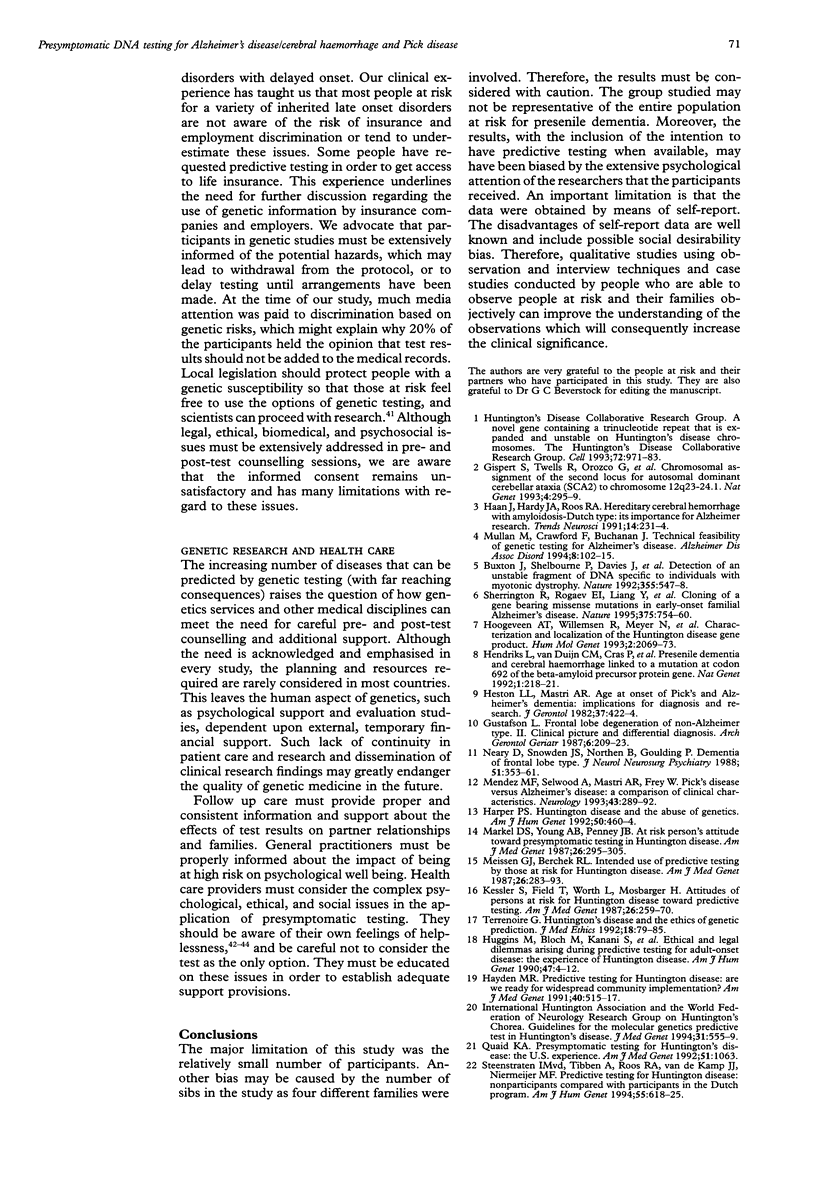
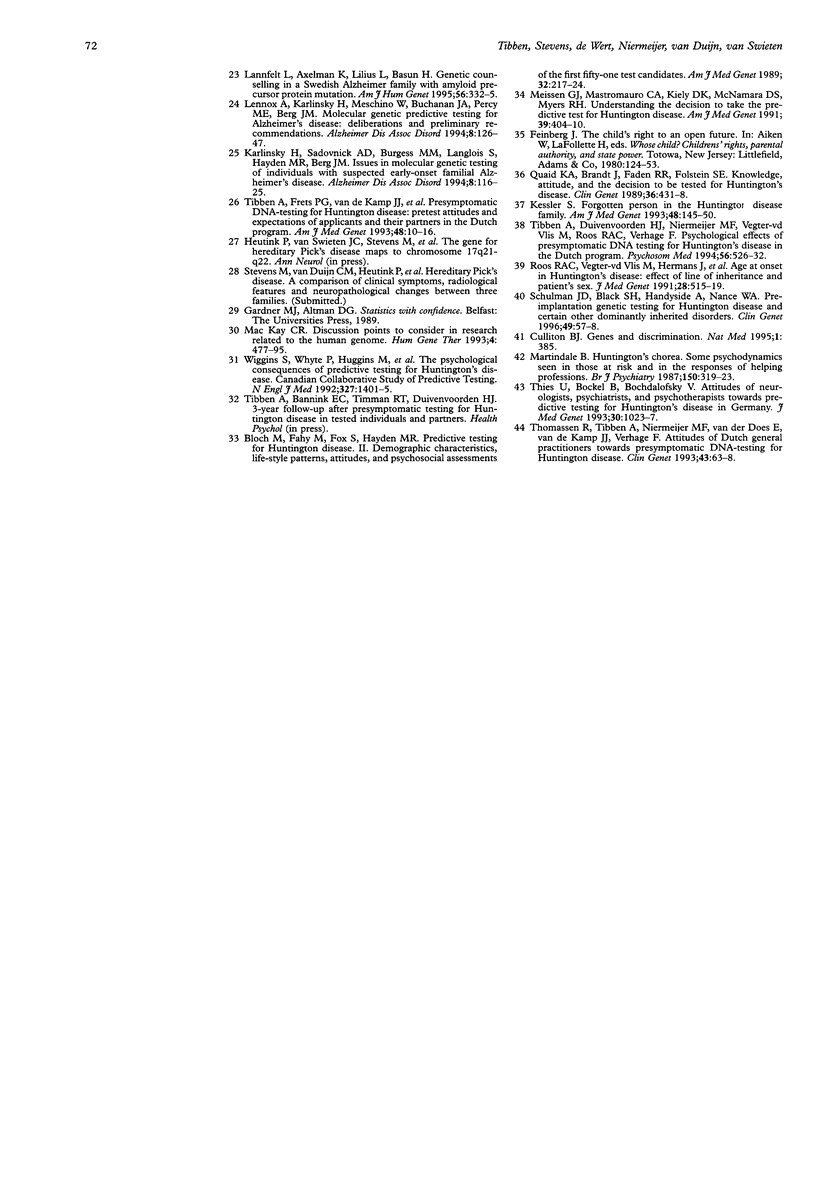
Selected References
These references are in PubMed. This may not be the complete list of references from this article.
- Bloch M., Fahy M., Fox S., Hayden M. R. Predictive testing for Huntington disease: II. Demographic characteristics, life-style patterns, attitudes, and psychosocial assessments of the first fifty-one test candidates. Am J Med Genet. 1989 Feb;32(2):217–224. doi: 10.1002/ajmg.1320320215. [DOI] [PubMed] [Google Scholar]
- Buxton J., Shelbourne P., Davies J., Jones C., Van Tongeren T., Aslanidis C., de Jong P., Jansen G., Anvret M., Riley B. Detection of an unstable fragment of DNA specific to individuals with myotonic dystrophy. Nature. 1992 Feb 6;355(6360):547–548. doi: 10.1038/355547a0. [DOI] [PubMed] [Google Scholar]
- Culliton B. J. Genes and discrimination. Nat Med. 1995 May;1(5):385–385. doi: 10.1038/nm0595-385. [DOI] [PubMed] [Google Scholar]
- Gispert S., Twells R., Orozco G., Brice A., Weber J., Heredero L., Scheufler K., Riley B., Allotey R., Nothers C. Chromosomal assignment of the second locus for autosomal dominant cerebellar ataxia (SCA2) to chromosome 12q23-24.1. Nat Genet. 1993 Jul;4(3):295–299. doi: 10.1038/ng0793-295. [DOI] [PubMed] [Google Scholar]
- Gustafson L. Frontal lobe degeneration of non-Alzheimer type. II. Clinical picture and differential diagnosis. Arch Gerontol Geriatr. 1987 Sep;6(3):209–223. doi: 10.1016/0167-4943(87)90022-7. [DOI] [PubMed] [Google Scholar]
- Haan J., Hardy J. A., Roos R. A. Hereditary cerebral hemorrhage with amyloidosis--Dutch type: its importance for Alzheimer research. Trends Neurosci. 1991 Jun;14(6):231–234. doi: 10.1016/0166-2236(91)90120-j. [DOI] [PubMed] [Google Scholar]
- Harper P. S. Huntington disease and the abuse of genetics. Am J Hum Genet. 1992 Mar;50(3):460–464. [PMC free article] [PubMed] [Google Scholar]
- Hayden M. R. Predictive testing for Huntington disease: are we ready for widespread community implementation? Am J Med Genet. 1991 Sep 15;40(4):515–517. doi: 10.1002/ajmg.1320400430. [DOI] [PubMed] [Google Scholar]
- Hendriks L., van Duijn C. M., Cras P., Cruts M., Van Hul W., van Harskamp F., Warren A., McInnis M. G., Antonarakis S. E., Martin J. J. Presenile dementia and cerebral haemorrhage linked to a mutation at codon 692 of the beta-amyloid precursor protein gene. Nat Genet. 1992 Jun;1(3):218–221. doi: 10.1038/ng0692-218. [DOI] [PubMed] [Google Scholar]
- Heston L. L., Mastri A. R. Age at onset of Pick's and Alzheimer's dementia: implications for diagnosis and research. J Gerontol. 1982 Jul;37(4):422–424. doi: 10.1093/geronj/37.4.422. [DOI] [PubMed] [Google Scholar]
- Hoogeveen A. T., Willemsen R., Meyer N., de Rooij K. E., Roos R. A., van Ommen G. J., Galjaard H. Characterization and localization of the Huntington disease gene product. Hum Mol Genet. 1993 Dec;2(12):2069–2073. doi: 10.1093/hmg/2.12.2069. [DOI] [PubMed] [Google Scholar]
- Huggins M., Bloch M., Kanani S., Quarrell O. W., Theilman J., Hedrick A., Dickens B., Lynch A., Hayden M. Ethical and legal dilemmas arising during predictive testing for adult-onset disease: the experience of Huntington disease. Am J Hum Genet. 1990 Jul;47(1):4–12. [PMC free article] [PubMed] [Google Scholar]
- Karlinsky H., Sadovnick A. D., Burgess M. M., Langlois S., Hayden M. R., Berg J. M. Issues in molecular genetic testing of individuals with suspected early-onset familial Alzheimer's disease. Alzheimer Dis Assoc Disord. 1994;8(2):116–125. doi: 10.1097/00002093-199408020-00008. [DOI] [PubMed] [Google Scholar]
- Kessler S., Field T., Worth L., Mosbarger H. Attitudes of persons at risk for Huntington disease toward predictive testing. Am J Med Genet. 1987 Feb;26(2):259–270. doi: 10.1002/ajmg.1320260204. [DOI] [PubMed] [Google Scholar]
- Kessler S. Forgotten person in the Huntington disease family. Am J Med Genet. 1993 Oct 15;48(3):145–150. doi: 10.1002/ajmg.1320480306. [DOI] [PubMed] [Google Scholar]
- Lannfelt L., Axelman K., Lilius L., Basun H. Genetic counseling in a Swedish Alzheimer family with amyloid precursor protein mutation. Am J Hum Genet. 1995 Jan;56(1):332–335. [PMC free article] [PubMed] [Google Scholar]
- Lennox A., Karlinsky H., Meschino W., Buchanan J. A., Percy M. E., Berg J. M. Molecular genetic predictive testing for Alzheimer's disease: deliberations and preliminary recommendations. Alzheimer Dis Assoc Disord. 1994;8(2):126–147. doi: 10.1097/00002093-199408020-00009. [DOI] [PubMed] [Google Scholar]
- Mac Kay C. R. Discussion points to consider in research related to the human genome. Hum Gene Ther. 1993 Aug;4(4):477–495. doi: 10.1089/hum.1993.4.4-477. [DOI] [PubMed] [Google Scholar]
- Markel D. S., Young A. B., Penney J. B. At-risk persons' attitudes toward presymptomatic and prenatal testing of Huntington disease in Michigan. Am J Med Genet. 1987 Feb;26(2):295–305. doi: 10.1002/ajmg.1320260207. [DOI] [PubMed] [Google Scholar]
- Martindale B. Huntington's chorea: some psychodynamics seen in those at risk and in the responses of the helping professions. Br J Psychiatry. 1987 Mar;150:319–323. doi: 10.1192/bjp.150.3.319. [DOI] [PubMed] [Google Scholar]
- Meissen G. J., Berchek R. L. Intended use of predictive testing by those at risk for Huntington disease. Am J Med Genet. 1987 Feb;26(2):283–293. doi: 10.1002/ajmg.1320260206. [DOI] [PubMed] [Google Scholar]
- Meissen G. J., Mastromauro C. A., Kiely D. K., McNamara D. S., Myers R. H. Understanding the decision to take the predictive test for Huntington disease. Am J Med Genet. 1991 Jun 15;39(4):404–410. doi: 10.1002/ajmg.1320390408. [DOI] [PubMed] [Google Scholar]
- Mendez M. F., Selwood A., Mastri A. R., Frey W. H., 2nd Pick's disease versus Alzheimer's disease: a comparison of clinical characteristics. Neurology. 1993 Feb;43(2):289–292. doi: 10.1212/wnl.43.2.289. [DOI] [PubMed] [Google Scholar]
- Mullan M., Crawford F., Buchanan J. Technical feasibility of genetic testing for Alzheimer's disease. Alzheimer Dis Assoc Disord. 1994;8(2):102–115. doi: 10.1097/00002093-199408020-00007. [DOI] [PubMed] [Google Scholar]
- Neary D., Snowden J. S., Northen B., Goulding P. Dementia of frontal lobe type. J Neurol Neurosurg Psychiatry. 1988 Mar;51(3):353–361. doi: 10.1136/jnnp.51.3.353. [DOI] [PMC free article] [PubMed] [Google Scholar]
- Quaid K. A., Brandt J., Faden R. R., Folstein S. E. Knowledge, attitude, and the decision to be tested for Huntington's disease. Clin Genet. 1989 Dec;36(6):431–438. [PubMed] [Google Scholar]
- Roos R. A., Vegter-van der Vlis M., Hermans J., Elshove H. M., Moll A. C., van de Kamp J. J., Bruyn G. W. Age at onset in Huntington's disease: effect of line of inheritance and patient's sex. J Med Genet. 1991 Aug;28(8):515–519. doi: 10.1136/jmg.28.8.515. [DOI] [PMC free article] [PubMed] [Google Scholar]
- Schulman J. D., Black S. H., Handyside A., Nance W. E. Preimplantation genetic testing for Huntington disease and certain other dominantly inherited disorders. Clin Genet. 1996 Feb;49(2):57–58. doi: 10.1111/j.1399-0004.1996.tb04327.x. [DOI] [PubMed] [Google Scholar]
- Sherrington R., Rogaev E. I., Liang Y., Rogaeva E. A., Levesque G., Ikeda M., Chi H., Lin C., Li G., Holman K. Cloning of a gene bearing missense mutations in early-onset familial Alzheimer's disease. Nature. 1995 Jun 29;375(6534):754–760. doi: 10.1038/375754a0. [DOI] [PubMed] [Google Scholar]
- Terrenoire G. Huntington's disease and the ethics of genetic prediction. J Med Ethics. 1992 Jun;18(2):79–85. doi: 10.1136/jme.18.2.79. [DOI] [PMC free article] [PubMed] [Google Scholar]
- Thies U., Bockel B., Bochdalofsky V. Attitudes of neurologists, psychiatrists, and psychotherapists towards predictive testing for Huntington's disease in Germany. J Med Genet. 1993 Dec;30(12):1023–1027. doi: 10.1136/jmg.30.12.1023. [DOI] [PMC free article] [PubMed] [Google Scholar]
- Thomassen R., Tibben A., Niermeijer M. F., van der Does E., van de Kamp J. J., Verhage F. Attitudes of Dutch general practitioners towards presymptomatic DNA-testing for Huntington disease. Clin Genet. 1993 Feb;43(2):63–68. doi: 10.1111/j.1399-0004.1993.tb04428.x. [DOI] [PubMed] [Google Scholar]
- Tibben A., Duivenvoorden H. J., Niermeijer M. F., Vegter-van der Vlis M., Roos R. A., Verhage F. Psychological effects of presymptomatic DNA testing for Huntington's disease in the Dutch program. Psychosom Med. 1994 Nov-Dec;56(6):526–532. doi: 10.1097/00006842-199411000-00008. [DOI] [PubMed] [Google Scholar]
- Tibben A., Frets P. G., van de Kamp J. J., Niermeijer M. F., Vegter-van der Vlis M., Roos R. A., van Ommen G. J., Duivenvoorden H. J., Verhage F. Presymptomatic DNA-testing for Huntington disease: pretest attitudes and expectations of applicants and their partners in the Dutch program. Am J Med Genet. 1993 May 1;48(1):10–16. doi: 10.1002/ajmg.1320480105. [DOI] [PubMed] [Google Scholar]
- Wiggins S., Whyte P., Huggins M., Adam S., Theilmann J., Bloch M., Sheps S. B., Schechter M. T., Hayden M. R. The psychological consequences of predictive testing for Huntington's disease. Canadian Collaborative Study of Predictive Testing. N Engl J Med. 1992 Nov 12;327(20):1401–1405. doi: 10.1056/NEJM199211123272001. [DOI] [PubMed] [Google Scholar]
- van der Steenstraten I. M., Tibben A., Roos R. A., van de Kamp J. J., Niermeijer M. F. Predictive testing for Huntington disease: nonparticipants compared with participants in the Dutch program. Am J Hum Genet. 1994 Oct;55(4):618–625. [PMC free article] [PubMed] [Google Scholar]


